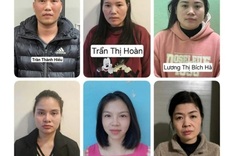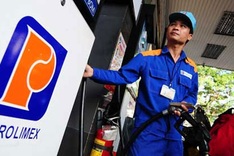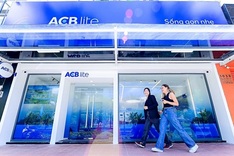>> Capital priority given to production, business
>> Inflation reaches record highs in first quarter
>> Black market for USD thrives despite ban
>> More reasonable policies for gold market needed
Vietnamese investors are hesitant to make decisions about where to place their assets, amid rising inflation and other uncertainties in the market.
 Along with the recent and widespread price hikes, including electricity and petroleum, the country’s inflation rate is reaching record highs in the first quarter of this year.
Along with the recent and widespread price hikes, including electricity and petroleum, the country’s inflation rate is reaching record highs in the first quarter of this year.
Vietnam’s CPI in March is estimated to grow by 2.2%, compared to 1.74% in January, and 2.09% in February. The Ministry of Planning and Investment said that, the first quarter’s CPI will rise of 6.1%, which would a new record.
An uncertain gold market
Gold has always been a safe haven for investors. Yet trading in gold bars has decreased by 30% after the Government’s crackdown on unofficial market.
Tran Nhat Nam from Bao Tinh Minh Chau Co., Ltd, a prestigious firm dealing in gold and precious stones, said that people have switched to buying jewellery instead of bars. Trading in gold rings has increased by between 50% and 60% in recent weeks. Jewellery accounts for around 60% of the company’s daily gold sales, he noted.
In the meantime, Do Minh Phu, Chairman of Doji Gold & Gems Group, said that gold has been people’s optimal choice of storing up for years. “If people are only allowed to sell gold bars via official channels, but are banned from buying, the unofficial trade of such goods may still thrive in unexpected ways due to high demand.”
Deputy Prime Minister Nguyen Sinh Hung affirmed that the people have right to own gold bars as long as they buy and sell at licensed institutions.
Tightening of the foreign currency market
The unofficial market for foreign currencies in Hanoi has been reduced next to nothing after recent regulations.
People are advised to go to commercial banks for official transactions but this service does not seem to have been able to replace the black market. Yet the effect seems to have been to simply move the points of trade in order to meet the real demand.
In fact, commercial banks can only sell USD to individuals who provide required documents. On the other hand they encourage customers to trade in their USD.
“It’s not that banks are running out of foreign currency, but our policy is to keep a reserve of these currencies for import and export reasons,” a banking official said.
Realty market on the decline
Recently, the State Bank of Vietnam (SBV), the country’s central bank, requested that capital sources should go to production and business, agriculture and rural development as well as small-and-medium enterprises (SMEs). This means that outstanding loans towards realty and securities must be reduced to a maximum of 22% by June, and 16% by the end of this year.
Due to these tighter policies, real estate companies are struggling to mobilise capital for their businesses. The slow-down in the market has discouraged investment in new projects.
According to Deputy Minister of Construction Nguyen Tran Nam, investors can be optimistic about the realty market for medium and long terms.
Gloomy stock market
The volatile stock market of recent months seemed to reduce investor confidence amid the lack of much positive news. There was a sharp increase in the stock market in early March, but prices of most of stocks have gone down in recent weeks. On the morning of March 17, the VN-Index was down to 460 points, and the HNX dropped to more than 90.
The stock market has been highly influenced by the country’s CPI in March, along with the new fiscal policies.
Deposits not an optimal choice
Making bank deposits is no longer seen as the safest investment channel, when the SBV has capped interest rates for deposits in VND for commercial banks at 14% per year, beginning March 3.
In order increase liquidity, many banks have increased the interest rates of non-term deposits to between 8% and 9% annually. Users of SeASave Smart at SeABank benefit an interest rate of up to 12% per year for such deposits.
Interest rates for deposits in USD are lower than those in VND after the Ministry of Planning and Investment proposed its five measures to prevent “dollarisation” and reduce currency speculation.




















